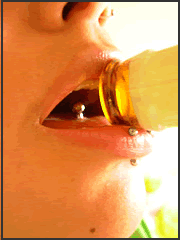
© iStock
In questionnaires delivered via mail or the Internet, 3,682 participants in 14 randomized controlled trials noted how much and how often they drank. They received personalized feedback and advice on whether their drinking patterns were normal for their peer group, based on their responses. Later, participants – most of them college-age – were re-surveyed to determine whether the intervention influenced their alcohol consumption.
The findings appear in the March issue of the American Journal of Preventive Medicine.
Riper, lead author of the meta-analysis, and colleagues discovered that even a single session of personalized feedback helped problem drinkers reduce alcohol consumption.
For every eight intervention participants, one person reduced his or her alcohol consumption to normal levels because of the feedback, a result similar to that found in interventions involving brief face-to-face contact with a mental health professional, Riper said.
“This is the most minimum intervention possible and the results were better than we thought,” Riper said. She said that because the interventions can occur via the Internet or mobile phones, drinkers could get cost-effective, personalized feedback on their drinking habits at their own time and pace.
“This is a wonderful early intervention for risky drinkers. Anyone who has concerns about their drinking could well be helped by using this method to check it out,” said Carlo DiClemente, Ph.D., a psychology professor and an addiction and health behavior specialist at the University of Maryland, Baltimore County.
However, DiClemente said that, although the authors used good strategies for selecting and evaluating the studies, the overall sample size was small and, individually, many of the studies did not find a significant effect. However, “they all seem to support a value for feedback,” he said.
This type of intervention “allows people to compare their own drinking to their own peer group, and you leave a lot of space for their own responsibility. You approach it more from a health point of view and comparison than from an approach of ‘it’s forbidden to drink alcohol.’ I think that’s a good motivation,” Riper said.Â
Source: American Journal of Preventive Medicine: Contact the editorial office at (858) 457-7292 or eAJPM@ucsd.edu. Riper H, et al. Curbing problem drinking with personalized-feedback interventions: A meta-analysis. Am J Prev Med 36(3), 2009. via Newswise
